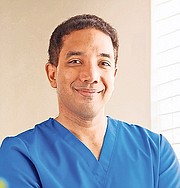By DR GREGGORY PINTO
Last week’s urology column dealt with the often embarrassing topic of premature ejaculation that affects as many as one in three men.
At some point in their lives, almost all men deal with the problem of not being able to achieve an erection quick enough after experiencing the first ejaculation.
Many men dread the second round of sexual intercourse as they feel that their male member fails them and is not up to the task of engaging again in sexual activity. There is often a great deal of anxiety and stress that men face when facing the task of repeating the performance of the first sexual act. This anxiety often makes getting an erection for the second round, even more difficult to attain.
What is the refractory period?
The refractory period is the scientific physiological term that describes the interval after the first ejaculation during which a man is unable to attain and maintain another erection.
The refractory period cannot be eliminated completely as it is a normal physiological process but there are ways to shorten the refractory period so that a man can respond more quickly for that second round.
Why is there a refractory period?
After a man has an orgasm, the penis becomes flaccid as neural signals are transmitted that cause the contraction of smooth muscle of the penis that releases the blood in the penis that had caused it to become erect.
The levels of the hormones testosterone and dopamine fall post orgasm and the pituitary gland produced hormone prolactin rises.
Lowered testosterone and elevated prolactin makes it more difficult to achieve an erection. After an orgasm, the brain also releases a surge in serotonin that makes a man feel like he wants to sleep after sex.
Post sex brain scans have scientifically proven that ejaculation causes reduced prefrontal brain cortex activity and the release of serotonin and oxytocin that makes men less alert and attentive and less likely to have sexual desire.
A 2006 study demonstrated that the key hormone prolactin, causing the refractory period, is 400 percent higher after penile vaginal intercourse than after self masturbation.
The refractory period is therefore longer after sexual intercourse with a partner than after solo masturbation.
Women also often experience a refractory period but it is often very short. Many women, however, experience ultra-sensitivity post intercourse and require a break after the first orgasm.
The refractory period for men is often age related, with teenagers usually requiring a few minutes and a 30-year-old requiring on average a 30-minute refractory period and a 50-year-old man requiring as long as one day.
How does a man shorten the refractory period?
There are varying scientific study results regarding the effectiveness of medications such as Viagra, Cialis and Levitra in reducing the refractory period to allow for a quicker response time for a second round of sexual intercourse. Most studies have shown some benefit in hastening the sexual recovery time, but the level of effectiveness is debatable.
Pelvic floor exercises are beneficial in lowering the refractory time.
The stress associated with the demand to achieve a second erection can be self defeating. A relaxed, tension free environment with an understanding partner could aid in limiting the refractory period.
Less frequent sex could also improve the recovery response time in achieving a second erection.
Increase dopamine levels
Low dopamine levels contribute to a longer refractory period after ejaculation. Men can increase their dopamine levels by eating foods such as tuna, chickpeas and asparagus that are rich in vitamins B6, B12 and folate.
Vasodilator foods
Natural vasodilators such as found in spinach, dark chocolate and watermelon improve the blood flow to the penis and an erection is achieved faster.
Lower prolactin levels
The increased prolactin levels after orgasm are strongly linked to longer refractory periods. Vitamin intake of B6 and vitamin E could potentially lower body prolactin levels in men in general.
A healthy lifestyle is important with routine exercise and a well balanced diet with lowering of cholesterol and good blood pressure control. Limit alcohol intake as alcohol can limit sexual arousal.
Sexual difficulties for both men and women can be potentially embarrassing topics.
Seek compassionate and confidential care from an urologist and regain a healthy and happy sexual life again.
• Dr Greggory Pinto is a board certified Bahamian urologist and laparoscopic surgeon trained in South Africa, Germany, and France. He can be reached at Urology Care Bahamas at the Surgical Suite, Centreville Medical Centre, # 68 Collins Avenue/Sixth Terrace, Nassau. Telephone: (242) 326-1929. E-mail: welcome@urologycarebahamas.com or visit the website:www.urologycarebahamas.com.





Comments
Use the comment form below to begin a discussion about this content.
Sign in to comment
OpenID